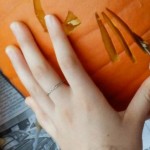We all have weird little things that annoy us.
I realize that we language freaks live in a different world than most people. I try not to wince when people use whom and who incorrectly, and I try not to slap folks who use impact as a verb.
I realize that we foodies live in a different world than the most people. Your loss.
I realize that we philosophers live in a different world than the most people. I try not to wince when people confuse strong arguments with valid arguments, and simply giggle to myself when folks describe things as being phenomenal. However, we all have issues we feel must be addressed, and the time has come (the walrus said) to talk of one such thing.
Looking at some children’s books the other day, I was shocked. Isn’t it about time we told children the truth instead of filling their impressionable young minds with half-truths and fable? Science isn’t scary; ignorance is what is scary.
I saw some brand new picture books about the five senses.
NONSENSE!
Let me make one thing perfectly clear: there are more than five senses. With only five senses, you couldn’t even get out of bed in the morning. For one thing, without equilibrioception, the senses which give you feedback on your equilibrium, you couldn’t get up at all. Without the sense of proprioception, the sense of bodily location, you wouldn’t even know if you were up.
Scientists disagree on how many senses we actually have, but depending on how you  parse them, we have anywhere between 13 and four dozen. What I mean by parsing is this: we would all agree that we have a sense we call sight. Is color perception the same sense as light perception, or are these two (within the eye, there are two distinct structures which provide each) separate senses? Is depth perception, which couples visual input with an awareness of the angle of the eyes in relationship to each other a separate sense?
parse them, we have anywhere between 13 and four dozen. What I mean by parsing is this: we would all agree that we have a sense we call sight. Is color perception the same sense as light perception, or are these two (within the eye, there are two distinct structures which provide each) separate senses? Is depth perception, which couples visual input with an awareness of the angle of the eyes in relationship to each other a separate sense?
Similarly, are the five different types of mouth taste—sweet, salty, sour, bitter, and umami—all one sense, or are these five senses?
We know very little about smell, in large part because it is so complex. Odd that taste, which is relatively simple, is broken down into 5 different sensations, but smell, which is tremendously complex, is left as just one sense. I believe my dog, who can sniff a storm on the wind, would beg to differ.
 Hearing is also mysterious, and from a phenomenological perspective fascinating, since it includes speed and frequency and duration—it is the closest we come to sensing time directly.
Hearing is also mysterious, and from a phenomenological perspective fascinating, since it includes speed and frequency and duration—it is the closest we come to sensing time directly.
For folks who persist in the notion that there are only 5 senses, everything else is touch. Yet even for the common view of touch, is using my fingers to sense the roughness of jagged granite, the pressure of a hand squeeze, and the temperature of the water in the dishrag bucket them same sense? If I were to feed you a grape, when you feel the pressure and give of it against your teeth as you bite into it, or when you feel the warmth of my breath against your cheek, or the gentle brush of my fingers across the back of your knee, are these all the same sense or are they different senses?
to sense the roughness of jagged granite, the pressure of a hand squeeze, and the temperature of the water in the dishrag bucket them same sense? If I were to feed you a grape, when you feel the pressure and give of it against your teeth as you bite into it, or when you feel the warmth of my breath against your cheek, or the gentle brush of my fingers across the back of your knee, are these all the same sense or are they different senses?
These, though, are only the outwardly directed senses. We in Western cultures are terribly forgetful of the body (you might not be at the moment, since I just tickled the back of your knee, but we as a culture are—trust me. And don’t get me started about Platonism). Most of the nerves we have are involved in provided us with feedback about our own bodies—even though these sensations often do not register consciously. When you kick me under the table (probably because I touched your knee), you will not have to look to see where your leg is—proprioception will let you sense where it is. This is useful if you drop something (your napkin, the Romanov jewels we lifted earlier that evening), have to locate it by feeling around with your foot, and then reach down—knowing where it is because you just felt it and knew where your foot was—you reach down your hand and pick it up.
In particular these kinesthetic senses are important because they allow the body to be the base from which all other senses operate. The kinesthetic sense of eye movement and adjustment is an important part of visual perception. Knowing where are body is allows the sense of touch to be effective. Body awareness allows us to integrate the external senses into a coherent awareness of our world. I have a good friend (Hey, Mel) who spends a great deal of time each day, each week retraining children who have an inadequate kinesthetic sense—an inability to be aware of where there body is. These senses can go haywire, and when they do, it affects everything.
How about temperature? You can sense the temperature of the air around you, but you can also sense your internal temperature. There is a tremendous difference in the different ways of sensing pain—pain on your skin (Cutaneous nociception), pain in your bones or joints (Somatic nociception), or internal organ pain (Visceral nociception). Nausea is sensed, but doesn’t fall neatly into any of the traditional 5 external senses, but also seems different from the pain of a stomach ache or a gut punch. Hunger is similarly sensed, but is a radically different feeling, and can be sensed either as a feeling of the stomach, or as a feeling of needing to eat, which is more realted to how the body feels in general. So many of these senses are vital to our survival, yet we don’t think of them as at all worthy of attention.
So enjoy your senses. Focus upon one at a time. Play with how many of them are involved in enjoying your meal tonight at the Bistro. They are all sensual–proprioception seems rather dull, but the sensation of dancing is magnificent. Equilibrioception is mundane, but we love playing games with it on swings and rollercoasters. Your senses are a wonder, but even this mystery pales beside the great mystery of how the mind puts them all together, and the greatest mystery of you being you.


Thanks for the shout out, Robert!
I understand what you mean about the simplistic nature of children’s books on subjects like the “five” senses Dr. Bear. Sometimes we start with an over-simplified example of a subject knowing its far more complex than presented. For example, the sense of touch is more about pressure and movement than just simply putting my hand on objects of difference surfaces. When we read a book to children, we may enhance that book with real life experiments. While blind-folded we and our students may touch a rough object and say “touch it harder” another may say “put more pressure” while another might say “lean in on it”. As we do this, we collaborate on the meaning of how to experience the sense of touch. Negotiating the meaning of the words we use with each other, is how we enrich and broaden the experience with words. So in the classroom, or for parents at home, the simple book becomes a starting point for further experiences.
The sense of hearing is far more complex than percieving sound vibrations coming to our ears. I may say “whoa, my equilibrium is off” while another may say “my balance is off”. Both have to do with functions of the inner ear but not alot to do with hearing. But we combine what we say with many different words and phrases to give more meaning to what we want to communicate. Young children have limited experience regarding the world around them. So we start with identifying body parts. I touch my ear and say “ear”. Thats very simplistic compared to a child a little older who might now know well the name of said apendage, but now is understanding that ears are for hearing. Developmental stages determine what we say to childten or read to them. But that doesnt mean that we dont embellish meanings of what is said by explaining or demenonstrating more than the child can verbalize at the time. Thus, the Ice Berg Theory (Vygotski), becomes very real. Children know far more than they can verbalize. They just havent given words to what they know yet. But the knowledge is there. So teacher/students and parent/child communication sounds simple but with nonverbal clues and collaboration with word meaning broaden their knowledge and understanding. There is so much more we can and do teach on a daily basis than may have been represented by the simple book on The Five Senses :-). Learning is a constant collaboration between children and the adults in their lives. I love this conversation !
Pingback: Beautiful Sensibility | Robert's Philosophy Bistro